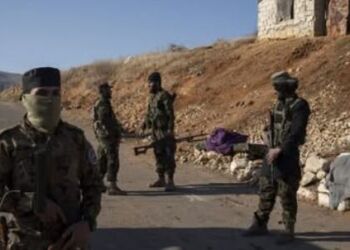This post is also available in:
![]() العربية
العربية
 10346512_214416285591632_5136145988550089363_n-300×169
10346512_214416285591632_5136145988550089363_n-300×169
After Mazen, 39, from Deir Ezzzor went through an unsparing and stringent experience in Assad-run prisons in Syria; it was predestined that he would survive the bloodthirstiness and barbarism practiced in them. He lives now in Amsterdam, Holland, after applying for asylum upon his arrival in the country as an illegal immigrant. He crossed the sea to reach safety in Europe like hundreds of thousands of Syrians fleeing indiscriminatory shelling, arbitrary arrest and uncivilized and inhumane practices perpetrated against them by both Assad and Daesh on a daily basis in Syria.
Mazen Bassis Al-Hamada is now an activist focused on documenting the cases of the detainees in Assad-run prisons in Syria. He concentrates on exposing their suffering to international media and has arranged multiple events and activities calling on the Assad-regime to make the fate of the detainees known to the public, in spite of his deteriorating health.
Mazen believes that he has a mission to fulfil as a former detainee in Assad-run prisons who took an oath inside them that one day he would expose the reality of these prisons to the world and that he would not overlook and forget about the detainees in case one day he was released.
Mazen says about his life before the revolution,” I from a rural family in the village of Albu Amro, Deir Ezzor’s eastern countryside. They lived in Deir Ezzor city where I was born, however, my family maintained and kept its social relationship with the people in the countryside.
The first arrest
Mazen was arrested for the first time during the events in Qamishli in 2004, after a football club called Al-Futuwa, whom Mazen was fan of, initiated a Kurdish uprising during a football game. He was accused of trying to temper with the security and inciting riots against the regime. Mazen says about that, “These were false charges because I rejected to get carried away behind the incitement that was waged by the Assad-regime and its security forces to provoke a division and strife between Arabs and Kurds.
Mazen was released shortly after that to be arrested again in 2007 on charges of inciting both the workers in a company and a sectarian strife, after demanding his right to a compensation for the damages of radioactive materials, which people of other province who work in the same company benefited from, whereas people in Deir Ezzor were deprived of. After he came out of detention, he filed a lawsuit, won the case, got his full rights, and returned to work in them.
He regarded the revolution as torture and arrest
Mazen and his brothers took part in the majority of the protests held in the city of Deir Ezzor. After attending a massive protest in which the protestors pulled down the statue of Bassil Al Assad in the public arena, he was again arrested and spent two weeks in jail to be released after a speedy trial. After months, he was arrested on Deir Ezzor-Damascus highway after returning from Damascus city.
Despite the arbitrary arrests Mazen was subjected to, he remained keen on his activity in the revolution through the documentation of detainees and informing the media about their fate until he was threatened along with his brothers with physical liquidation by the security forces branch in Deir Ezzor. Therefore, he preferred to leave the province for Damascus, hoping the situation and conditions in the province would change so that he could come back again.
During his stay in Damascus, Mazen coordinated with defectors from the Assad forces in order to secure their defection. He also worked in relief during his stay in the café of Saruja in Damascus. Having succeeded along with two of his relatives in passing and delivering food aid and infant formula to the town of Darya, which was under siege at the time, the regime security forces raided the place and arrested Mazen and his relatives.
For several hours as Mazen was being transferred to an Assad’s prison, he could not tell which destination he was headed to as his eyes were closed by the regime forces. After he was thrown in a jail where dozens of detainees were held and was no more than a few meters, he immediately realized that he was in the military prison of Al-Maza.
He later witnessed the brutal torture practiced against detainees, from beating and cracking ribs to torture by using electricity and piles. Mazen moved from one cell to another and from one dormitory to another. He was also tortured with all the previous mentioned methods, which would have a serious impact upon his health for a long time later.
Mazen was let out of prison in poor health after serving a nearly fifteen months; however, he did not succumb to his injury and decided to carry on his revolutionary activities in his hometown of Deir Ezzor, where he remained active in the field of relief and documentation for several months. However, as Daesh was getting close to the province, things worsened and he made up his mind to leave for Turkey to work on the issue of detainees. He could not stay for long in Turkey as he “felt alienated towards the organizations affiliated with the Syrian Opposition operating in Turkey at the time”.
Mazen was arrested on 20/04/2012 to be released from prison in late September 2013. It is still painful for him now when he remembers that he has left in Assad’s jails his brother, a dentist, and sister’s husband, an engineer, and the two sons of his sisters, university students. Several days have passed so far and he is still unable to know anything about their fate. Because of them and the rest of the detainees, Mazen pursue his struggle.










